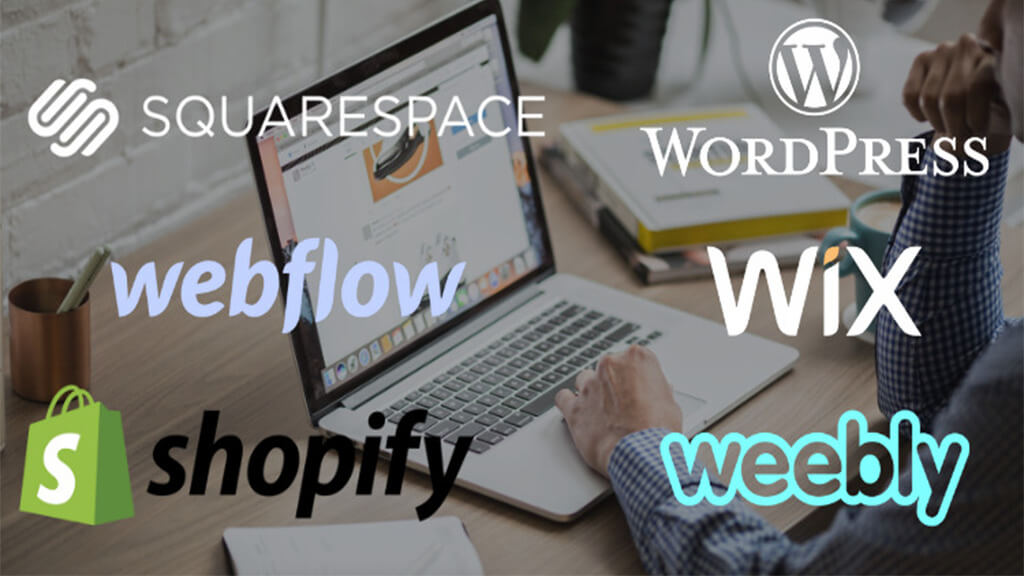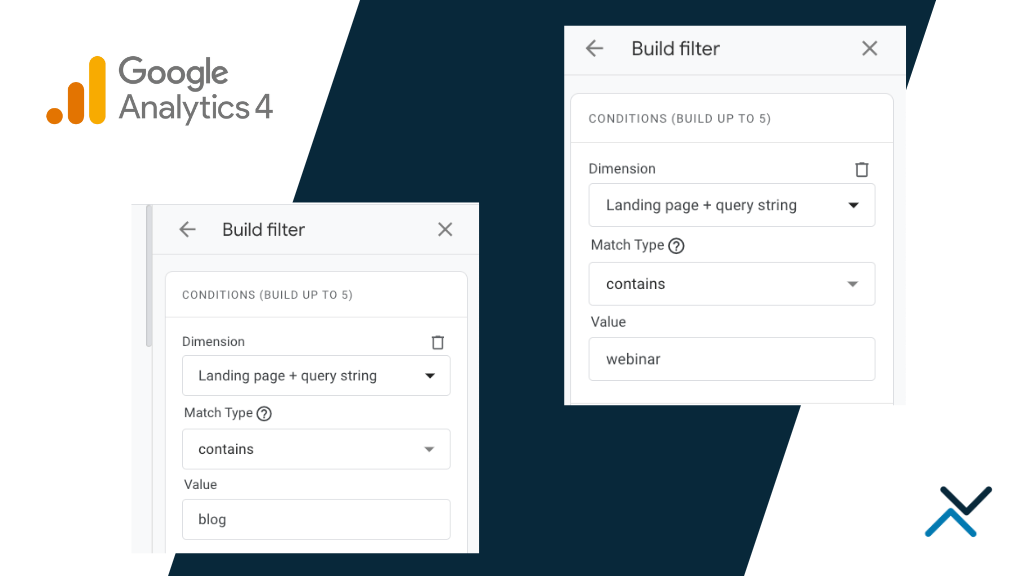In the modern digital age it is vital for businesses to have an online presence, and that starts by having a functioning website. If you, like many others, have no previous experience in this area you may feel overwhelmed at the idea of creating a website to represent your business. With no shortage of platform choices available to take a business online, how do you know which web website service will fit your needs for now, and have the capacity to grow with you?
We polled a handful of small business owners and web designers to get their opinions on the best website builders to use in 2021, including GoDaddy, Wix, Squarespace, Shopify, Webflow, Weebly and WordPress. Take a look at the information below and make the most informed decision for your business needs.
QUICK LINKS
The Top Small Business Website Builders in 2021
GoDaddy
When thinking of website services, GoDaddy might be the first to come to mind. As a major player in the web space, GoDaddy helped pioneer domain purchasing and hosting in the early 2000s, and have certainly had no shortage of commercials and other advertising over the years. As a solution for small businesses, GoDaddy offers a website building tool that is low-cost and easy to configure. Users have the option to select a pre-made template, fill in their content and take their website live in just a few hours.
Pros:
- Templates are easy to choose from and they are responsive
- Affordable monthly cost to host a website through the building tool
- Simple interface to configure pages and add content
Cons:
- Very little customization allowed
- Limited to a certain number of pages
- Not a great tool if you plan to grow your business
- Very plain looking designs without personality
- Limited analytics and tracking data (i.e., you are not able to use Google Analytics 4)
- GoDaddy’s support is located overseas and difficult to reach
Of the marketers and web designers we polled, not a single one had a recommendation for GoDaddy’s site builder. While it’s a good place to get started, you will face limited functionality and will eventually move to a different platform. If you are only interested in a landing page that you will rarely update and don’t need anything too functional, this might be the best site builder for you.
Wix
Wix belongs to a class of web building services that operate under a “freemium” model. Creating a very basic website is free to start, but access to custom URLs and other advanced features is not, forcing users to pay into one of several monthly subscription services that offer different benefits in each tier. While slightly more expensive than GoDaddy, customers enjoy using their drag-and-drop tools for website design, intuitive interface and the ease of which you can create simple website projects. While Wix can support a more professional look, it does have several limitations small business owners may run into.
Pros:
- Intuitive front-end website builder
- No coding required by business owners
- Includes a library of licensed and free images site owners can use
- Design templates are easy to choose from and configure in just a few hours
- Has a range of approachable monthly pricing plans
Cons:
- Limited access to code means limited customizations
- Starter plan is filled with advertorials and will make users upgrade quickly
- Although touted as responsive for all devices, layouts are not always mobile optimized
- Limited tracking and analytics; it’s recommended to use 3rd party analytics in place of the default analytics
- Although Wix engineers have made significant strides to improve its SEO capabilities, it still falls short by most SEO standards
What Others Are Saying About Wix
“Wix is my website builder of choice. The platform is straightforward to use and enables you to create and launch a website extremely quickly. I once sat with a client while she set up her Wix account, created a single page site, and had it live all within one hour.”
“Wix is like that new friend where something just seems off and the more you get to know them – the less you like about them. And if you’re smart – you stop being their friend and you call your old friend WordPress and apologize for thinking there was someone better out there.”
Like most budget website builders, Wix is a great solution to get started when you’re just launching a business. However, if you need customizations to fit your brand and growth goals, you’ll need to look to a different platform.
Squarespace
Like Wix and GoDaddy, Squarespace is another pay-as-you-go web service. For $12 a month, you get access to a basic template library, a custom domain, and basic SEO and analytics features. If you’re looking for more robust features, you’ll have to opt into one of the more expensive monthly plans or pay for separate plug-ins. Once you have the right plan, the platform offers an intuitive drag-and-drop builder, e-commerce integrations and more.
Pros:
- Preferred platform for anyone who does not want to use any code
- Ability to use custom CSS if needed
- Functionality to support portfolios, blogging and e-commerce
- Integrates with marketing emails to reach site visitors / customers
- Templates are responsive, ready for devices of all screen sizes
Cons:
- User interface may not be intuitive to the average user; editing pages and navigation comes with a learning curve
- Requires advanced subscription to access header code (necessary for Google Analytics, Google Search Console and other 3rd party platforms)
- Different versions make it difficult to understand what codebase you’re on
- Not friendly to ad networks like Google Adsense
- Staging site creates unnecessary duplication that can be indexed by Google if not properly configured (bad for SEO)
What Others Are Saying About Squarespace
“Its simplicity is a major pro and for entrepreneurs like me, who do everything on their own, it is great. I’ve been able to get my website set up quickly and easily and I can hop in to edit within minutes. Another pro was how easy Squarespace made it to create my own domain and have it registered.”
“Squarespace stands above the competitors because it has a savvy blogging tool. Blogging on your store is a great way to connect with customers and even boost your SEO. Squarespace offers over 100 templates with mobile included and super low pricing for beginners.”
If you have a flexible budget for an advanced site, Squarespace could be a good option for you. It’s a step up from GoDaddy and Wix, and has more capabilities to help you grow your business, especially if you’re just getting into e-commerce.
Shopify
Shopify is an e-commerce builder that lets you make your own online shop with ease. It gives you a wide array of customizable themes that are able to meet branding requirements, and let you sell either digital or physical products with configurable payment gateways. For anyone starting an online store, Shopify is an ideal choice.
One of the main goals of Shopify is to let new business owners build their own online store with limited knowledge of code and web design. Based on the success of the company in the last few years, they have succeeded at this masterfully. Business owners can set up a store and products with in just a few hours without ever touching HTML or CSS. However, the platform can also cater to web developers by offering complete access to HTML, CSS, and Liquid files (Shopify’s language).
Pros:
- Easy to set up and start an online store in just a few hours
- Modern templates to choose from with responsive design for all screen sizes
- Great for dropshipping businesses and entrepreneurs
- Multiple integrations including point-of-sale systems for physical storefronts
- SEO-friendly platform with a strong focus on improvement from Shopify engineers
- Multiple payment gateways to make the shopping experience a breeze for customers
Cons:
- If users want to expand on pre-designed templates, they must know HTML / CSS / Javascript and Shopify’s Liquid files
- Backend organization can be complex and require a learning curve (it’s important to have an understanding of e-commerce taxonomy)
- Products are uploaded manually or through a 3rd party product information management system (PIM); this can take time until a process is put in place
- Transaction fees applied for all payment gateways
- Reporting tools require an advanced monthly subscription, however, it’s easy to integrate tracking tools like Google Analytics
- Most 3rd party plugins require a monthly subscription
What Others Are Saying About Shopify
“We chose Shopify because it was very easy to use. With people in their 20s to 70s working in our store, we wanted something that could be easily managed no matter what someone’s experience was. The backend of Shopify was like using Microsoft Word for the most part, so it was extremely easy for everyone to become very accustomed to using it.”
“Shopify allows smart technical people to build apps that you can easily plug into your website to customize the look, speed, conversion, reach, etc. It’s quick and easy to set up and use, provides excellent 24/7 support, and allows you to sell your products on multiple channels. It also offers free mobile responsive ready to use themes.”
If you’re getting into the world of e-commerce, Shopify needs to be in your consideration set. It’s ease-of-use combined with ability to be customized to a business’s liking makes it a superior platform for selling products. The cost is also very friendly and scales as your business grows.
Webflow
Webflow initially started in San Francisco in 2013 as a tool to alleviate headaches with code. Like Wix, Squarespace and GoDaddy, Webflow offers a drag-and-drop builder with features to create responsive websites for anyone who doesn’t want to mess with code. The platform itself is still widely supported by CSS, HTML and JavaScript, which allow business owners to create websites that are visually appealing and interactive, supporting animations as well. With a number of free and premium templates available, it’s easy to get a site launched in just a matter of hours.
Pros:
- Packed with features including a content management system, e-commerce tools and marketing integrations
- Little to no code makes it easy for anyone to get started building a website
- Choose from several different free and paid templates
- Webflow University provides documentation on all aspects of the platform
- Plans start at $12 / month with an offer for a free trial, along with a “grow with you” type model
- The company prioritizes clean code, making it highly accessible and SEO-friendly
Cons:
- The more features required, the higher the monthly cost (to be expected from any platform)
- Professional templates can be expensive for a business just getting started
- 3rd party integrations are still new and growing; the integration repository may not have everything you need
- Traffic can be restricted depending on the selected plan
- Coding is limited, meaning certain customizations are limited
What Others Are Saying About Webflow
“Webflow is in my opinion the best website builder for someone who is completely new to building websites. It is really easy to get used to and is user friendly. You don’t need a strong understanding of coding to use it, and there are tons of video clips and help pages available if you can’t figure out how to build what you need.”
“I think Webflow is the “new WordPress” when it comes to creating a website. I started using it when doing freelance work, and it’s what we used to build the website of froged.com. Also a good point is that you don’t need to hire anyone to get started and publish the first version of your website in Webflow.”
While it’s still relatively new to the market, Webflow is definitely making strides to become the leader in codeless web development. And best of all, the platform allows a “free forever” trial so you can jump in and discover if it’s the right platform for you without even spending a penny.
Weebly
Weebly is another site builder that edges into the site space of online shopping. Though it’s not suited for bigger e-commerce sites with multiple products, it gives smaller shops a very economical way of entering the e-commerce world. The platform is also great for personal websites and blogs as it offers a completely free plan for users.
Pros:
- Drag-and-drop functionality with several different modules
- Wide variety of templates to choose from
- Easy integration with Weebly apps and add-ons
- Plans range from free to $26, depending on required features
- Offers basic SEO functionality (title tags, meta descriptions)
Cons:
- Designs are basic with limited options for customization
- Format and layouts are not always responsive for all screen sizes
- 3rd party integrations may not work for certain requirements
- Limited analytics and tracking (a 3rd party tool is a must)
“The biggest pro of using Weebly is that it’s easy to use. It’s a drag-and-drop builder, so even the biggest technophobe should have no problem. They also make it easy to upload various types of multimedia, such as video, audio and photos.”
“My preferred website builder is Weebly that offers an easy-to-use service that is ideal for those who are new to website building and on a budget. This builder offers a free and paid professional version which will cost you just $12/month.”
Like the other budget website builders, Weebly offers its users a cost-effective way to take a business online. However, it’s not suited for long-term growth and can’t support many customizations.
WordPress
WordPress was just a simple blogging platform when it started in 2003. Today, it is the largest CMS on the market powering more than 34% of websites on the internet. WordPress is one of the most highly recommended platforms when it comes to building a website, from both business owners and web designers. In fact, of the 50+ professionals who responded to this request, 90% recommended WordPress as the preferred website builder. With its open-source framework, the platform offers infinite customizations, plug-ins, themes and community support. It can also power e-commerce through its WooCommerce solution.
Pros:
- A large community to answer nearly any question that may come up
- Open-source framework with access to CSS, PHP, Javascript and more
- Ability to customize nearly everything
- Themes, plugins and add-ons to suit just about any business requirement
- Most website themes are responsive for all screen sizes
- SEO-friendly with options to customize source HTML
- The preferred platform for small-to-midsize businesses
Cons:
- Requires hosting through a 3rd party platform
- Typically requires a developer to set up site environment / hosting (can be expensive)
- Frequent updates to core files, plugins and themes
- Due to its open-source framework, it can be susceptible to security issues and needs to be monitored frequently
- Although a large community of users exists, there is no dedicated support from WordPress
“Wordpress is my favorite website builder for small businesses. Because it’s open source, you can literally do anything. So unlike most other website builders such as Wix, you’re not limited with what your website can do. You never know what feature you might want to add to your website so WordPress is always the best option.”
“I have two sites and I used Wix to build the first one. I was experiencing issues with load speed and had a designer optimize it and the fastest they could get was 5 seconds which is horrible. My developer switched the site to WordPress and the same exact site now loads in under 2.5 seconds.”
These are just a couple of the responses we received in favor of WordPress. As an SEO company, we are a bit biased to WordPress due to its optimization and customization capabilities. We’ve worked with clients on all platforms, yet time and time again, those on WordPress tend to do the best at growing organic traffic.
Final Thoughts on the Top Website Builders of 2021
As we see it, there are two categories of business owners looking for a website builder: those who want something simple and low cost, and those who want total control with options to customize everything and grow.
If you are new to web design, builders like GoDaddy, Wix, Squarespace, Webflow and Weebly might be right for you. They are budget-friendly solutions that can help you get a website up and running in a relatively short amount of time. However, it should be noted that while these platforms have thrived by offering users a simplified experience, they inherently have major limitations and tend to cause headaches for businesses who are looking to expand beyond their basic capabilities. Eventually, as a business grows, it will outgrow these platforms and will need to move to a different solution. And while these budget options offer basic e-commerce capabilities for a site, they don’t quite cut it compared to Shopify or WordPress.
It’s no secret that our preferred choice of website builder (and just about everyone we spoke to) is WordPress, hands down. But we don’t love WordPress just for the ability to customize everything to the client’s liking. It’s the ability to manage SEO effectively within WordPress that makes it stand out above every other platform we reviewed. From speed optimizations to the way content is managed to pure data of what sites rank well in Google, WordPress stands above the rest.
While we have our opinion, it’s important for you to make the best choice for your business requirements and budget!
If you have any questions about the website platforms we reviewed or how to choose the right option for your business, please don’t hesitate to reach out to [email protected].









